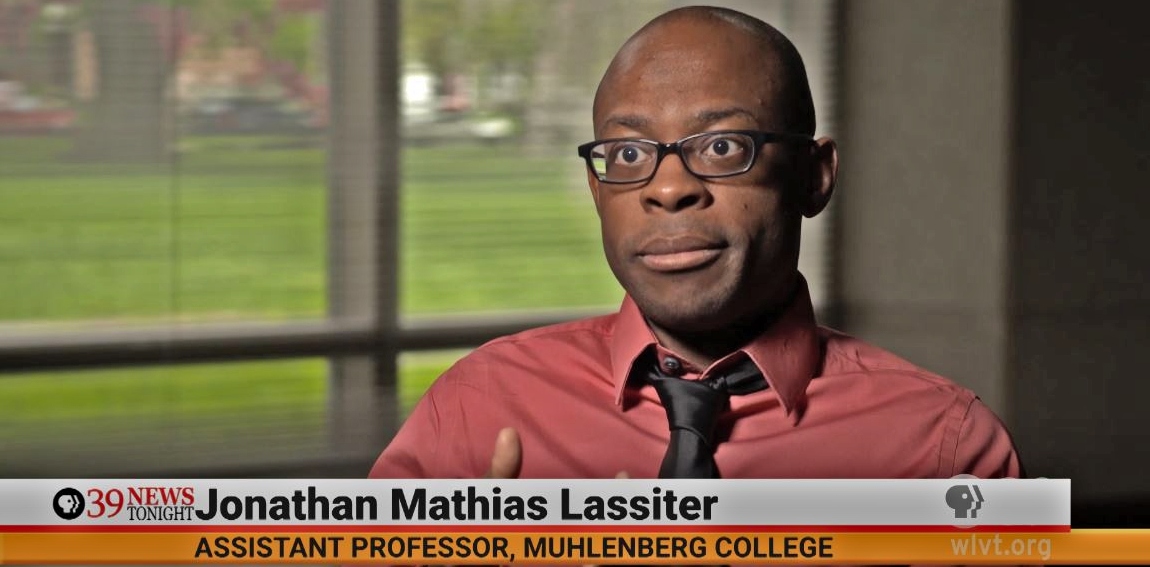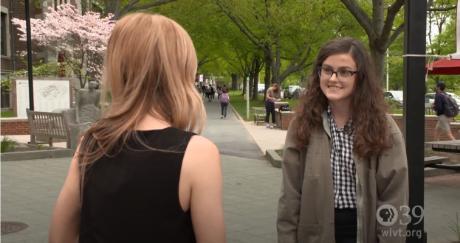Professor Jonathan Mathias Lassiter and Students Share their Perspectives on a Historic Presidential Candidate
The Muhlenberg community members were featured in a PBS39 news segment about the presidential candidacy of Pete Buttigieg.By: Kristine Yahna Todaro Tuesday, June 11, 2019 10:30 AM
 Professor Lassiter talks about his research and the impact of Buttigieg's presidential candidacy. Image courtesy of PBS39.
Professor Lassiter talks about his research and the impact of Buttigieg's presidential candidacy. Image courtesy of PBS39.The historic presidential candidacy of Pete Buttigieg was the topic of a recent PBS39 news segment that featured Jonathan Mathias Lassiter, assistant professor of clinical psychology, and five Muhlenberg students.
The film crew came to campus to interview Lassiter, whose research often focuses on spirituality and LGBT Americans, about the first openly gay Christian presidential candidate in the country's history. They also wanted to ask Muhlenberg students what this means to them as the next generation of voters.
Lassiter says while Buttigieg's candidacy is unique in terms of sexuality, the politician is still familiar as a traditional leader because of his race, gender and education level—which may make some Americans more comfortable envisioning him as president.
And what does Buttigieg's sexuality mean to young voters? Lassiter says, for them, having a candidate who identifies as a gay man seems to be no big deal. But, he adds, "Do I think it influences them and can possibly be encouraging for them? Definitely."
Emily Drake '21, below, told PBS39 that Buttigieg's candidacy doesn't necessarily open the doors for everyone. "I feel like it's not open to all gay people….Even I myself as a white woman have been able to be more open but other minority groups may not and may face greater risks."
Drake was interviewed with Aevyn Barnett '22, Nikki Gagliano '19, Christian Nemeh '22, Sophia Richter '19 and Nikki Gagliano '19, who summed up her thoughts, saying, "Anyone should be allowed to run, as long as they can get the job done."
Lassiter has analyzed data from a national study of 1,071 racially diverse gay and bisexual men in the United States and found that approximately 81.7 percent of these men reported attending some religious services as children. In fact, 73.1 percent of these gay and bisexual men grew up attending Christian denominational churches. While the numbers of gay and bisexual men reporting formal religious participation drop to about 40.3 percent when these men become adults, a significant proportion still identify as "spiritual but not religious."
These findings suggest that religious and spiritual beliefs have a real impact on the lives of sexual minority Americans like Buttigieg. Lassiter says these issues are even more pronounced in communities of color where Black and Latino men have rated the importance of their religious and spiritual beliefs at significantly higher levels compared to men of other races and ethnicities. Sexual minority people are often exposed to religious messages that demonize their sexual orientation. These have been associated with higher levels of internalized homonegativity, which in turn can cause mental health problems such as depression.
Despite this, Lassiter says many sexual minority people have reclaimed their faiths for themselves. In another study, he found that some sexual minority men were able to reach a place of peace related to being a gay Christian by, for example, questioning the interpretations of sacred scriptures that condemned same-sex attraction or by seeking support from other religious sexual minority people.
Lassiter, a leading expert on Black LGBT health and intersectional Afrocentric psychology, is co-editor, with Lourdes D. Follins, of Black LGBT Health in the United States: The Intersection of Race, Gender, and Sexual Orientation (2017), the first text to focus solely on the holistic health of Black LGBT Americans. The book looks at the mental, physical, and spiritual aspects of health, and considers both risk and resiliency factors for the Black LGBT population.
He also recently co-authored Black Sexual Minority Men’s Disclosure of Sexual Orientation Is Associated With Exposure to Homonegative Religious Messages (American Journal of Men's Health, 2018) and he’s currently working on his first sole-authored trade press book that will explore contemporary issues of race and mental health in the United States.

